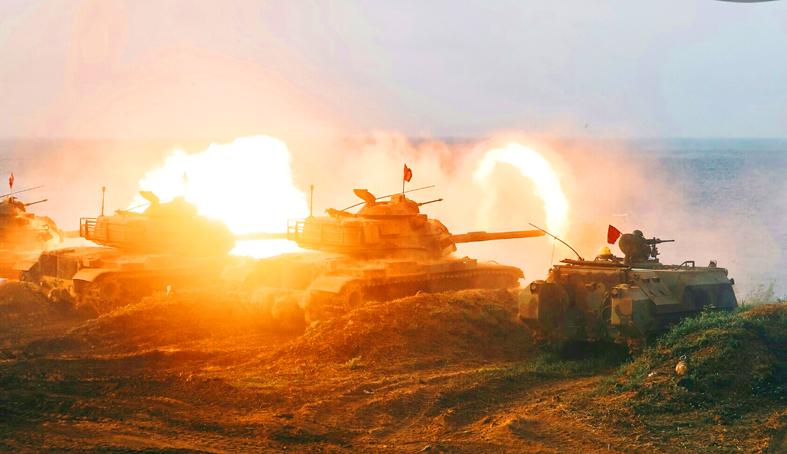A full Chinese invasion of Taiwan with troops landed and ports and airports seized would be very difficult to achieve due to problems China would have in landing and supplying troops, the Ministry of National Defense said in its latest threat assessment.
In a report to lawmakers, the ministry said as China’s transport capacity is limited, it would not be able to land all its forces in one go, and would have to rely on “non-standard” roll-on, roll-off ships that would need to use port facilities and transport aircraft that would need airports.
“However, the nation’s military strongly defends ports and airports, and they will not be easy to occupy in a short time. Landing operations will face extremely high risks,” the ministry said in its report, a copy of which was reviewed by Reuters.

Photo courtesy of the Military News Agency via CNA
China’s logistics face challenges, too, as any landing forces would need to be resupplied with weapons, food and medicine across the Taiwan Strait, it added.
“The nation’s military has the advantage of the Taiwan Strait being a natural moat and can use joint intercept operations, cutting off the communist military’s supplies, severely reducing the combat effectiveness and endurance of the landing forces,” the report said.
China would also need to keep some of its forces in reserve to prevent any foreign forces joining in to help Taiwan and to keep a close watch on other fractious areas of China’s border, such as with India and in the South China Sea, the report said.
“US and Japanese military bases are close to Taiwan, and any Chinese Communist attack would necessarily be closely monitored, plus it would need to reserve forces to prevent foreign military intervention,” it said. “It is difficult to concentrate all its efforts on fighting with Taiwan.”
Experts say that China has other means at its disposal to bring Taiwan to its knees short of a full invasion, including a blockade or targeted missile attacks.
President Tsai Ing-wen (蔡英文) is overseeing a military modernization program to make Taiwan harder to attack, making the military more mobile and providing it with precision weapons such as long-range missiles to take out an attacking force.
The government is planning to spend an extra NT$240 billion (US$8.63 billion) over the next five years mostly on weapons and new warships for the navy.

‘DENIAL DEFENSE’: The US would increase its military presence with uncrewed ships, and submarines, while boosting defense in the Indo-Pacific, a Pete Hegseth memo said The US is reorienting its military strategy to focus primarily on deterring a potential Chinese invasion of Taiwan, a memo signed by US Secretary of Defense Pete Hegseth showed. The memo also called on Taiwan to increase its defense spending. The document, known as the “Interim National Defense Strategic Guidance,” was distributed this month and detailed the national defense plans of US President Donald Trump’s administration, an article in the Washington Post said on Saturday. It outlines how the US can prepare for a potential war with China and defend itself from threats in the “near abroad,” including Greenland and the Panama

The High Prosecutors’ Office yesterday withdrew an appeal against the acquittal of a former bank manager 22 years after his death, marking Taiwan’s first instance of prosecutors rendering posthumous justice to a wrongfully convicted defendant. Chu Ching-en (諸慶恩) — formerly a manager at the Taipei branch of BNP Paribas — was in 1999 accused by Weng Mao-chung (翁茂鍾), then-president of Chia Her Industrial Co, of forging a request for a fixed deposit of US$10 million by I-Hwa Industrial Co, a subsidiary of Chia Her, which was used as collateral. Chu was ruled not guilty in the first trial, but was found guilty

A wild live dugong was found in Taiwan for the first time in 88 years, after it was accidentally caught by a fisher’s net on Tuesday in Yilan County’s Fenniaolin (粉鳥林). This is the first sighting of the species in Taiwan since 1937, having already been considered “extinct” in the country and considered as “vulnerable” by the International Union for Conservation of Nature. A fisher surnamed Chen (陳) went to Fenniaolin to collect the fish in his netting, but instead caught a 3m long, 500kg dugong. The fisher released the animal back into the wild, not realizing it was an endangered species at

DEADLOCK: As the commission is unable to forum a quorum to review license renewal applications, the channel operators are not at fault and can air past their license date The National Communications Commission (NCC) yesterday said that the Public Television Service (PTS) and 36 other television and radio broadcasters could continue airing, despite the commission’s inability to meet a quorum to review their license renewal applications. The licenses of PTS and the other channels are set to expire between this month and June. The National Communications Commission Organization Act (國家通訊傳播委員會組織法) stipulates that the commission must meet the mandated quorum of four to hold a valid meeting. The seven-member commission currently has only three commissioners. “We have informed the channel operators of the progress we have made in reviewing their license renewal applications, and